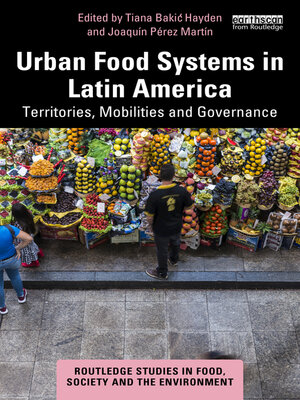Urban Food Systems in Latin America
ebook ∣ Territories, Mobilities and Governance · Routledge Studies in Food, Society and the Environment
By Tiana Bakić Hayden

Sign up to save your library
With an OverDrive account, you can save your favorite libraries for at-a-glance information about availability. Find out more about OverDrive accounts.
Find this title in Libby, the library reading app by OverDrive.



Search for a digital library with this title
Title found at these libraries:
| Library Name | Distance |
|---|---|
| Loading... |
Drawing on a range of case studies from across Latin America, this book highlights the ways that urbanization shapes the food systems that feed this region's cities, approaching the problem of food in cities as a particularly urban problem.
Latin America is the most urbanized area in the world, with nearly 80% of the population living in cities, where rates of food and nutritional insecurity are persistently high, and where the social and spatial organization is characterized by inequality and segregation. The broader questions addressed in this volume are as follows: How do the specific processes and dynamics of Latin American urbanization influence or shape food systems? How can urban food systems develop forms of governance that supports food security and sustainability? After a general introduction, this volume is organized into three main sections: Territories, mobilities, and governance. The chapters consider how specific elements such as urban planning, zoning, migration, gentrification, informal settlements, logistics, retailers, wholesale markets and street vendors, among others, contribute to shaping how food is distributed, sold, and bought in cities. Drawing on studies and theoretical approaches written by scholars and practitioners from Argentina, Brazil, Chile, Ecuador and Mexico, this book provides a Latin American perspective on global discussions surrounding the role of cities in ensuring food access to urban populations.
This volume will be of great interest to students, scholars, and policymakers interested in food systems, urban food, urban planning, sustainable urban development, and Latin American studies.







